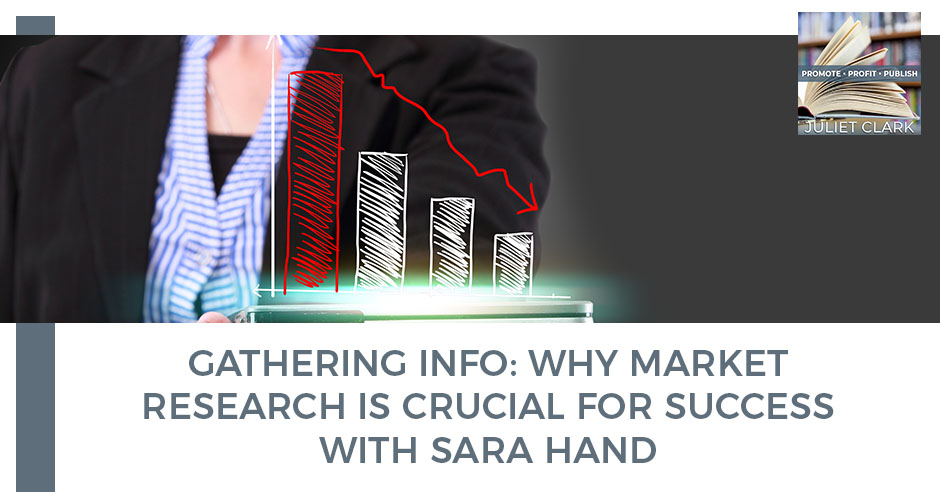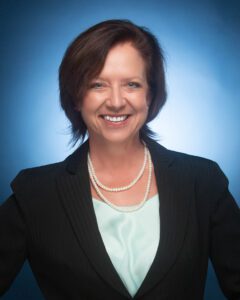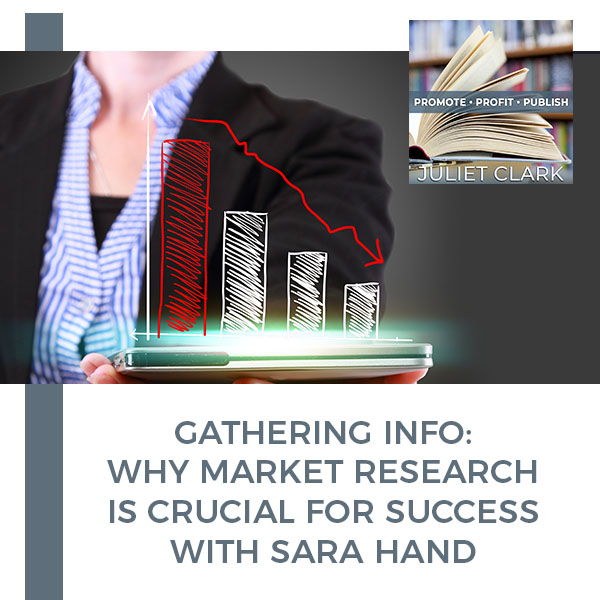
Gathering info is vital in identifying who you serve. Without accurate audience data, you won’t know how best to provide value. Juliet Clark’s guest in this episode is Sara Hand, the CEO and Visionary Leader of Spark Growth. Sara explains that clients don’t care about what you think. What they care about is the value you can provide. Invest time, talent, and treasure in empowering others. Safeguard relationships. Then success will be within easy reach. Tune in!
—
Watch the episode here
Listen to the podcast here
Gathering Info: Why Market Research Is Crucial For Success With Sara Hand
All of us are getting ready for New Year 2022, we’ve done our work or we’re just starting. I’m excited about our guest because we’re going to talk about something that so many small businesses are missing. Before we get into it, don’t forget to go over and take the Promote, Profit, Publish Quiz. You can find it at www.PromoteProfitPublishQuiz.com. Find out if you’re ready to publish that book. Have you done the prep work, the audience work, and the work we’re going to talk about, the niching? Don’t forget to go over there and check that out.
Our guest is Sara Hand and she is the CEO and Founder of Spark Growth, a multinational professional consulting company. As a visionary leader with a strong and diverse business development background, Sara is experienced across public and private sectors, industry verticals, and early-stage investment. She finds and leverages unique value propositions and is widely recognized for fostering collaboration and driving action-focused agendas for business and community development. Welcome, Sara.
Juliet, I’m so glad to be here.
It’s great to have you. You and I were chatting before we jumped on. I shared with you that I see a lot of people out, they’re new entrepreneurs, and they are jumping into, “I’m going to hire a marketing company to market my business,” and then they’re running up against a lot of failures. A lot of that is because the questionnaires from the marketing company don’t relate to the fact that these people are seeking out marketing. They’re not hitting the right audiences. It’s this catch-22 where people are spending a lot of money. You do a lot of surveys in private and public sectors to get down to this. Can you talk about that a little bit? Why is it so important to do this market research?
We had a workshop here and the gentleman who was leading it, I have known for a very long time. He said, “The average person in the United States has one breast because they’re 50% male and 50% woman.” That’s the average. Data can tell us a lot of things but having accurate data is key in identifying who you serve. A lot of times, what we find is people have a generic survey.
They do a survey and try to get feedback or don’t do a survey at all. They just guess, “This is who I want to serve.” When we work with clients, what we say is, “It doesn’t matter what you think. The marketplace rewards companies that provide value.” If you’re going to provide value, you need to connect to that client. In getting great surveys and responses, we start with asking questions and an interview.
If you were one of my clients or somebody that I thought I was going to work with, I would start asking you some questions and utilize that for my survey so that the questions that I would ask would be based on understanding, whether they were effective or not. I know you have a survey platform and work with a lot of your clients on that. Not all surveys are as effective as others. When you start, how do you work at getting great survey results also?
Having accurate data is key in identifying who you serve.
I start with the product, service or idea, and then what does success look like in those areas? That’s where we start having people not only relate to success like, “I want to be successful in this area,” which gets them excited about taking it. One of the things that a lot of people complain about is, “I can’t get anybody to take it.” When we put it together and there was something key, it’s a win-win. It’s not all about, “Can you give me feedback?” It’s, “Can I give you feedback, too?”
You start with the client, and if you were asking me, you would say, “What does success look like?” I would say, “Success looks like this,” and then you reverse engineer. If success looks like this, then we figure out, “Who would I need to work with to be able to have that type of success?” We do a lot of community engagement and I’ll give you an example of what community engagement doesn’t look like. Community engagement does not look like making a decision that you want to do something, sending out a bunch of emails, and hoping everybody likes it or sending out some postcards. I will give you an example. Our company does some work in the smart cities space.
In the place where I grew up, there was an entity there that in this region did a smart cities project. They had no idea but I did because all my friends on Facebook who knew that I had done some smart cities work tagged me. Do you know what Facebook looks like when it doesn’t look good, you have this conversation that you don’t want to be involved in at all and people keep tagging you?
I’m not on anymore but I remember those days.
You don’t want to participate. What happened is this major industry partner did a smart cities project. They didn’t do community engagement and the community got all wild up. I’m like, “Is Big Brother watching you? Is it this and this?” People who knew that I had done work in that space kept tagging me. These people over here are like, “We had a great community engagement.” I’m like, “No.” If you saw what people were saying, they didn’t know. The Voice of the Customer, whether it’s the community at large or it’s something even more targeted, is about that communication. Sending a postcard, an email or talking to 1 or 2 people is not enough.
We’re going to go all over the place with some of this stuff, the tagging on Facebook. I see people do it all the time to get an influencer’s attention. They’re not paying attention. They have teams. That influencer is not on there. I had a call with somebody who was name-dropping all of these people that she talked to and tagged. I was like, “Why are you talking to me? Aren’t you getting great results from that?” The truth was no. Tell me your honest opinion. When that happened, were you annoyed?
I was very much so, especially because it was a contentious conversation. I do tag people very specifically for things that I know that they are interested in. I don’t do that all the time and it’s very targeted. I posted something specific on LinkedIn about digital twinning and what virtualization and augmented reality means in the urban planning space. I tagged two of the city leaders, who I know, that are working in that area that were mentioned in the article, and our industry partner, who is a part of that project.

Gathering Info: If you’re in a space that has significant influence, you have to safeguard relationships.
I don’t put them on everything. I tag them to things that are specific to them. That’s a key piece like you said about name-dropping. One of my friends is a former Olympic ice skating champion. She has all her contacts locked down on LinkedIn and she’s very careful in tagging. It’s important to be careful with those relationships. I do a lot of work with investors. I have to guard the integrity and that relationship. If you just put a list of people on there, you can damage those relationships.
For me, I work with people all over the world. I was in India and we were having a conversation around the table. Somebody said something about this other person over here. I was like, “You should know this person.” They’re like, “I do. That’s crazy.” If you are in a space that has significant influence, those relationships are something you have to safeguard.
If you only work in a small space and it’s not a space of influence, you can screw up, misbehave, and have bad business practices. You can go to another city, town and reopen. Not everybody may know your past. Especially when you talk about publishing, being in this area of influence, your relationships are one of the most precious things that you can have. That’s how I met you.
I’ll give you a great example. The people that I talk to that don’t hire me, release their book on their own, and tag me like I was part of the process. I literally get so upset by that because if you’re out there doing a crappy job of it and tagging me all over the place, it looks like I did that work or I helped you with that work. They don’t connect it that way. They think my audience will see it. That’s why you have to be so careful about that. The keyword there was integrity. Have some integrity. Don’t try to attract my audience because I’m looking at that from a whole different side of the spectrum of, “I’m not associated with that work, and you associated me with it.” It’s the same thing.
If I had a friend that’s looking to publish and they’re saying, “I’m excited. I’m going to start writing my book.” I would say, “I might tag you or you should talk to Juliet.” This is off topic, but you and I talked about it. I had a friend and stopped this friend. They had a very good decision. They wrote this book and quit their position after the book was published because they were sure that they were going to replace this six-figure income within the first eight months to a year by publishing their first book. It’s not as easy as that. There’s a whole process, writing it and self-publishing. How many people have garages full of books? I tied that into the Voice of the Customer and the survey stuff that you do.
That would be odd. What does success look like? All those things we talked about are not. Here’s the thing when we do the surveys, probably yours is very much the same, is we flip that success and we have the measure where they’re at for success. We are, on one hand, showing them what success looks like and it’s not tagging all those other people and not doing the work.
We’re also finding out where people are at and where they need help. When we do those deep dives, we have something in mind. The reason we want to do them is that idea is a guess. When we’re putting something out there, you can’t put it out there and hope people will come. That idea is a guess and now we’re testing the guess. Is there room for this? Are people excited?
Invest time, talent, and treasure in other people to empower them.
You were talking about the post where nobody was excited about this. There was a perception on one side that things were going well. There was a perception on the other side that’s not what people are saying. That’s where we try to bring this all together. What are people are saying and thinking? Do you have a receptive audience here?
On that, what would be interesting for me is in the number of people that you work with, do people come to you sometimes and go, “I know people are interested in this.” When they dive into the material, do you help them reframe it so that they can find their voice in where they’re going?
Are you interviewing me or am I interviewing you?
This is what I do every day.
You are getting a good view of how you should be doing this. That’s a great question because it depends on the idea. I have my ear to the ground on a lot of things, so I usually know what’s relevant and what’s not in whatever is the nowadays world. Sometimes I have to keep from rolling my eyes because I know that the idea will never come to fruition.
Here’s what’s behind that and why active listening is a big part of this. There’s ego. If someone starts a conversation with, “I saved four lives this week,” and makes it about them, and pitches me an idea that’s much different than somebody coming to me who is an actual doctor, and this person was not a doctor. An actual person comes to me and says, “I’m a mental health professional and I would like to help more people. This book is the avenue to do it. What are your thoughts about messaging?”
There’s a real difference between separating the ego of an idea and the idea that people want to help and can. A lot of times, that’s what I look for. If I think that you have a good idea, the messaging is there, and the topic is relevant, then I want to work with you and be glad to help you. If I think you’re all about the ego and aren’t qualified to do what you’re doing, then chances are I’m not going to help you explore that and will discourage you from working with me. That was horrible.

Gathering Info: When you go through difficulties, it pushes you through the cheesecloth, and you get to say what’s important.
What I love about that is everyone is not your prospect. My COVID story is that my mom was diagnosed with brain cancer, I became a very serious caregiver, and my brother was in an accident. I have two companies, a space, and clients who count on me in this space to keep them open. What happens when you go through those types of things in the midst of this type of environment is it pushes you through the cheesecloth and gets you to say, “What’s really important?” I have had prospects before that I did not work with, for some reason. Sometimes there are clients that I took on that were going to be a great project or it was going to pay well or it was whatever.
In the last few years, I have helped clients do this but even more so for myself. I’m saying, “What is it that I most want to do? Who do I most want to work with? In this legacy piece, how can I do the best, have the most impact, and get very clear on how we serve in a way that other companies don’t?” I’m glad that there are people that you don’t work with. If you work with everybody or one of my friends said, “If everybody relates to you on all these different things, then what do you stand for? If you stand for everything, what actually has meaning?”
I experienced something very similar to you. The lesson I got out of it was now I set clear boundaries and only do what I can do. I have on number three on my goals and intentions, it says, “Staying in my zone of genius.” I find that every time I try to help somebody and it’s outside of my zone of genius, and I do this a lot of times because I want to help, it becomes a nightmare. You have to learn to set those good boundaries and only do what you intend to do on that. Did you find that? It sounded like you did with the priorities and, “I only have time for this. I have to get super intentional and only take it.”
In the middle of that, in our space, our company is an anchor client in our own coworking space. My CARES Act dollars did a nice remodel. We expanded that part of the business. That time, we had fifteen members that we were able to keep. We’re at 30 members now. We’re a small coworking-type of space and it’s not what we do fully for business. It’s a program that we run. The investment into that made it easier to manage and help our clients stay open.
In the middle of my mom being sick and all these different pieces, I hired some more people, took on some phenomenal equity investment, a stake in a company, and had to get clear on my time, “This day is a focus day.” I focused time, free time, and buffer time taking control of my schedule. I would be at my parent’s house for ten days at a shot and stay working from my computer, sitting next to my mom while she was on her bed.
When you’re pushed, you say, “This is important and this other stuff isn’t.” That ties back to when we talk about surveying the Voice of the Customer. I have an organization that I serve and it’s called TiE. It stands for The IndUS Entrepreneurs. We have a chapter in Tampa. I’m in the Tampa Bay area. I had the opportunity to lead our board in a strategy session when our new president came in earlier in 2021.
It’s so interesting because sometimes TiE is the largest investor and entrepreneur organization in the world. It’s very easy to say we serve entrepreneurs because that is what we do. Our primary audience is our Charter Members, and our Charter Members are entrepreneurs and corporate executives who have been very successful. They believe that wealth generation is good and that if you know how to do that, there’s a responsibility tied to that.
Know how best you can provide value.
Our Charter Members have a belief set and they invest their time, talent, and treasure in other people to empower them. Our Charter Members serve our organization and entrepreneurs because this is the heart. Whereas if we simply served entrepreneurs down here and did not address the heart of our charter members, we wouldn’t have them. They’re the ones who spend their time and talent. We serve students and in diverse groups. Our Charter Members write checks. They don’t just talk about doing the right thing and they actually write checks. We did a $400,000 investment and raised money with three chapters.
The way we know our Voice of the Customer is we ask our members, “What is it you most care about?” We only have this much bandwidth. There are 63-some chapters around the world. Some chapters are huge. In San Francisco, they have 250 charter members in their chapter. We’re a smaller organization. We have to get very specific on how we serve, whether it’s your book or your company. Knowing how you best provide value goes back to our survey.
Where can we find you if we want to find out more?
I’m fairly easy to find. It’s @SaraHand on LinkedIn and my company is called Spark Growth. For us, what it is all about is watching people and their companies grow and flourish.
Thank you so much for being on.
Thank you so much for having me, Juliet. I enjoyed it.
Important Links
- www.PromoteProfitPublishQuiz.com
- Spark Growth
- LinkedIn – Sara Hand
About Sara Hand
 Sara Hand is the CEO and founder of Spark Growth, a multi-national professional consulting company. As visionary leader with a strong and diverse business development background, Sara is experienced across public and private sectors, industry verticals and early-stage investment. Sara finds and leverages unique value propositions and is widely recognized for fostering collaboration and driving action-focused agendas for business and community development.
Sara Hand is the CEO and founder of Spark Growth, a multi-national professional consulting company. As visionary leader with a strong and diverse business development background, Sara is experienced across public and private sectors, industry verticals and early-stage investment. Sara finds and leverages unique value propositions and is widely recognized for fostering collaboration and driving action-focused agendas for business and community development.









Leave A Comment